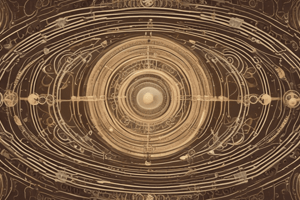Podcast
Questions and Answers
Who is recognized as the father of atomic theory among the ancient Greeks?
Who is recognized as the father of atomic theory among the ancient Greeks?
- Leucippus (correct)
- Democritus
- Anaximander
- Anaximenes
What was Archimedes best known for?
What was Archimedes best known for?
- His contributions to mathematics
- His inventions in chemistry
- His philosophical theories
- His work with fluids (correct)
What concept did Archimedes use to advance science?
What concept did Archimedes use to advance science?
- Alchemy
- Trial and error
- Mathematics (correct)
- Philosophy
What substance did Anaximenes propose as the most basic element in nature?
What substance did Anaximenes propose as the most basic element in nature?
Which statement best describes Archimedes' relationship with science during his time?
Which statement best describes Archimedes' relationship with science during his time?
What is the relationship between Anaximenes and Anaximander?
What is the relationship between Anaximenes and Anaximander?
What happens when air thickens according to Anaximenes' theory?
What happens when air thickens according to Anaximenes' theory?
Which of the following methods did Archimedes invent for determining the volume of an object?
Which of the following methods did Archimedes invent for determining the volume of an object?
Which early Greek scientist built on Anaximenes' concepts by introducing the idea of atoms?
Which early Greek scientist built on Anaximenes' concepts by introducing the idea of atoms?
What phrase is famously attributed to Archimedes upon discovering a principle?
What phrase is famously attributed to Archimedes upon discovering a principle?
What concept did Leucippus introduce in relation to matter?
What concept did Leucippus introduce in relation to matter?
In Anaximenes' view, what does the thinning of air produce?
In Anaximenes' view, what does the thinning of air produce?
What central idea did Anaximenes and Leucippus both contribute to the early development of science?
What central idea did Anaximenes and Leucippus both contribute to the early development of science?
What major idea was challenged by Gregor Mendel's work?
What major idea was challenged by Gregor Mendel's work?
What is the main contribution of Louis Pasteur to science?
What is the main contribution of Louis Pasteur to science?
Which process is associated with Louis Pasteur's discoveries?
Which process is associated with Louis Pasteur's discoveries?
Which term best describes the study of how traits are passed from parent to offspring?
Which term best describes the study of how traits are passed from parent to offspring?
Who is regarded as the father of modern genetics?
Who is regarded as the father of modern genetics?
What aspect of microbiology did Louis Pasteur focus on?
What aspect of microbiology did Louis Pasteur focus on?
What was one of the significant outcomes of Johann Gregor Mendel's experiments?
What was one of the significant outcomes of Johann Gregor Mendel's experiments?
What was the significance of the book published by Andreas Vesalius?
What was the significance of the book published by Andreas Vesalius?
What significant contribution did Nicolaus Copernicus make during the Renaissance?
What significant contribution did Nicolaus Copernicus make during the Renaissance?
Which of the following statements about Andreas Vesalius is true?
Which of the following statements about Andreas Vesalius is true?
What was one of the major errors in Ptolemy's view of the universe?
What was one of the major errors in Ptolemy's view of the universe?
Which of the following statements relates to Pasteur's contribution to food safety?
Which of the following statements relates to Pasteur's contribution to food safety?
Which statement best describes the impact of the Renaissance on science?
Which statement best describes the impact of the Renaissance on science?
What role did the translation of Greek philosophers play during the Renaissance?
What role did the translation of Greek philosophers play during the Renaissance?
What is the primary focus of the Copernican System introduced by Nicolaus Copernicus?
What is the primary focus of the Copernican System introduced by Nicolaus Copernicus?
How did the works of Nicolaus Copernicus and Andreas Vesalius contribute to the scientific revolution?
How did the works of Nicolaus Copernicus and Andreas Vesalius contribute to the scientific revolution?
What theory is Albert Einstein best known for developing?
What theory is Albert Einstein best known for developing?
Which phenomenon did Einstein explain that contributed to the understanding of energy?
Which phenomenon did Einstein explain that contributed to the understanding of energy?
What does the Bohr Model represent?
What does the Bohr Model represent?
Which concept did the Bohr Model struggle to explain?
Which concept did the Bohr Model struggle to explain?
What fundamental principle emerged in science as a result of Planck's work?
What fundamental principle emerged in science as a result of Planck's work?
What aspect of scientific understanding did quantum mechanics transform?
What aspect of scientific understanding did quantum mechanics transform?
Why was Newton’s law insufficient for explaining atomic motion?
Why was Newton’s law insufficient for explaining atomic motion?
What effect did Einstein's contributions have on the scientific community?
What effect did Einstein's contributions have on the scientific community?
Flashcards are hidden until you start studying
Study Notes
Ancient Greeks - The First True Scientists
-
Anaximenes was an associate of Anaximander.
-
He believed air was the most basic substance in nature.
-
He theorized when air thinned out it became fire.
-
He also believed when air thickened it became liquid and then solid.
-
Anaximenes attempted to explain that everything in nature is made up of a single substance.
-
Leucippus built upon the concepts of Anaximenes.
-
He believed all matter is composed of small units called “atoms”, and introduced the concept of atoms.
-
He is considered the Father of Atomic Theory.
Louis Pasteur
- Pasteur was a French chemist and microbiologist.
- He destroyed the idea of spontaneous generation.
- Made great advances in the study of bacteria and other organisms.
- Pasteurization — Pasteurized milk.
- Pasteurization is the process of heating a liquid to a certain temperature for a set period of time to kill harmful bacteria.
Gregor Mendel
- Mendel was an Augustinian monk who studied reproduction.
- He was a devout Christian.
- He is considered the Father of Modern Genetics.
- Mendel created the study of genetics, which studies how traits are passed down through generations.
Archimedes
- Archimedes disliked science but enjoyed invention.
- During this time, real science was actively discouraged.
- He used mathematics to advance science.
- He was one of the first scientists to demonstrate the close relationship between mathematics and science.
- He is best known for his work with fluids and invented a method to determine the volume of an object.
- This method led to the discovery of the relationship between mass and volume, which is known as density (density = mass/volume).
- His famous phrase, "Eureka!" means "I have found it!"
Alchemy
- Alchemy passed for science during this time.
- Alchemists believed they could find a way to transform lead into gold.
- This practice involved mixing substances to create change.
- This approach relied on trial and error and was based on observation and recording.
- It contributed to the development of practical techniques and the discovery of new substances.
The Renaissance: The “Golden Age” of Science
- During this time period, science flourished.
- New ideas and discoveries were made in astronomy, medicine, and other fields, and science began to be viewed as a valuable tool for understanding the natural world.
Nicolaus Copernicus – Copernican System
- Copernicus challenged the accepted view of the universe, which was based on the work of Ptolemy.
- Ptolemy believed the Earth was the center of the universe. The Ptolemaic system places the Earth as the center of the Solar System, with the sun and other planets orbiting around it.
- Copernicus proposed a heliocentric model, which placed the Sun as the center of the solar system.
- He created the Copernican system, later disproven by Galileo's observation of Venus.
Andreas Vesalius – Revolutionized Biology & Medicine
- Vesalius was an anatomist who wrote a revolutionary book, “On the Fabric of the Human Body”, published in 1543.
- The book was the first to illustrate all the internal structures of the human body.
- He is considered the Father of Human Anatomy.
Albert Einstein
- Einstein is best known for developing the Theory of Relativity.
- He explained the photoelectric effect which describes how light can knock electrons out of metal. This couldn't be explained by Newton's Laws of Motion.
- He validated quantum mechanics, the idea that energy exists in discrete units called quanta.
Niels Bohr
- Bohr created the concept of the Bohr Model of an atom, which is based on solid mathematical principles.
- The Bohr Model is a scientific model describing the structure of atoms.
- He helped unveil the mysteries of the atom.
- Bohr’s work helped establish quantum mechanics as the guiding principle in modern science.
The Scientific Community
- Science is moving forward and is more accepted in society.
- Scientists are now more likely to share information and build on each other's work.
- Science is now used to solve many problems that face society.
Studying That Suits You
Use AI to generate personalized quizzes and flashcards to suit your learning preferences.




